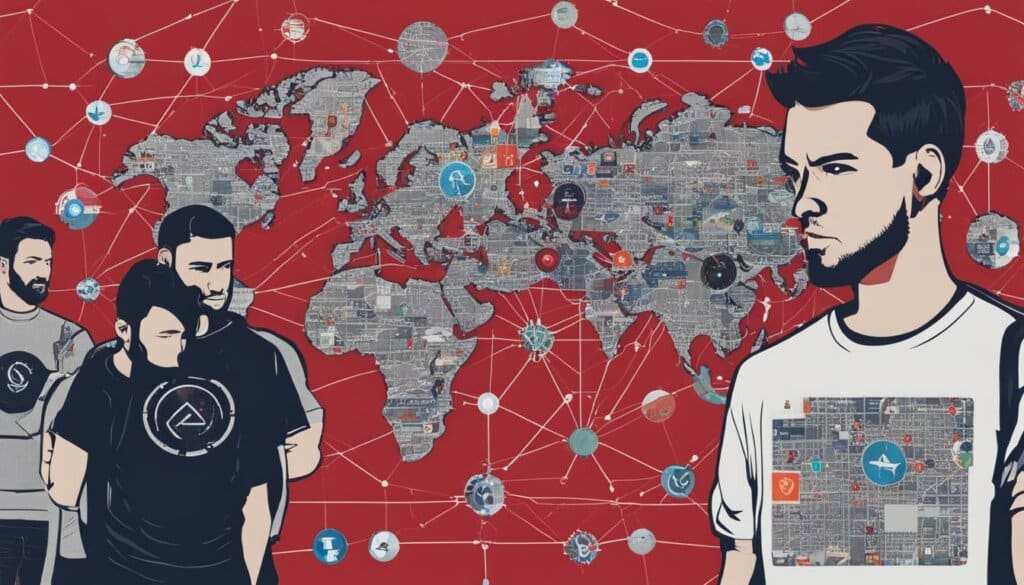Table of Contents
The sharing economy has seen a significant rise in popularity, with platforms like Airbnb and Uber connecting individuals to share resources and services. However, with this increased connectivity comes the need for robust cybersecurity measures to ensure the safe and trustworthy exchange of shared resources. Cyber threats pose a risk to both users and platforms, and it is essential to address the cybersecurity challenges within the sharing economy to protect sensitive data, maintain privacy, and build trust among users.
When it comes to the sharing economy, ensuring safety is paramount. Secure sharing economy platforms play a crucial role in creating a secure environment for users. These platforms invest in advanced security measures to protect user data and transactions, encryption technologies, and authentication protocols that safeguard sensitive information. By prioritizing cybersecurity, these platforms build trust and confidence among users, thereby fostering the growth and sustainability of the sharing economy.
The Importance of Cybersecurity Information Sharing
The sharing economy relies heavily on trust and security to ensure the safe and reliable exchange of resources and services. Cybersecurity information sharing plays a vital role in addressing the vulnerabilities and threats within this innovative economic model. By gathering, analyzing, and sharing information about cyber threats, sharing economy platforms and users can enhance their situational awareness and take proactive measures to prevent, protect, and mitigate potential attacks.
Sharing best practices, security solutions, and threat intelligence among sharing economy participants builds a collaborative network that fosters mutual trust and strengthens the overall security of the ecosystem. It allows platforms and users to stay informed about the latest cyber threats and adapt their security measures accordingly. By leveraging the collective knowledge and experience, the sharing economy can establish a robust cybersecurity framework that safeguards sensitive data, maintains privacy, and instills confidence among users.
“Cybersecurity information sharing is essential for the sharing economy ecosystem to thrive and remain resilient against evolving cyber threats.”
– Cybersecurity Expert
Furthermore, effective cybersecurity information sharing enables platforms and users to address common challenges and identify emerging trends. It facilitates the development and implementation of proactive measures to reduce the risk of cyber incidents and ensure the long-term sustainability of the sharing economy. Collaborative efforts in sharing cybersecurity information also create a feedback loop, where participants can learn from each other’s experiences and improve their own security posture.
| Benefits of Cybersecurity Information Sharing |
|---|
| Enhanced situational awareness |
| Proactive prevention and mitigation of cyber threats |
| Improved trust and confidence among users |
| Effective response to emerging trends and challenges |
| Collaborative learning and knowledge exchange |
By recognizing the importance of cybersecurity information sharing and actively participating in collaborative efforts, sharing economy stakeholders can strengthen the overall security and resilience of the ecosystem. It requires a culture of openness, trust, and cooperation, where participants are willing to contribute their insights, experiences, and expertise to support the collective security of the sharing economy.
Building Trust through Cybersecurity Information Sharing
Trust is the foundation of the sharing economy, and cybersecurity information sharing plays a crucial role in establishing and maintaining that trust. When platforms and users share information about cyber threats, it demonstrates their commitment to transparency and collaboration, which in turn strengthens user confidence and trust in the ecosystem.
By openly sharing information and working together to address cybersecurity challenges, sharing economy participants can foster a sense of community and shared responsibility. This collaborative approach builds trust among users, reinforces the security measures implemented by platforms, and ultimately enhances the overall safety and resilience of the sharing economy.
Incentives for Cybersecurity Information Sharing
Sharing cybersecurity information within the sharing economy is not only necessary but also beneficial for all participants. There are several incentives that encourage cybersecurity information sharing in this collaborative ecosystem.
One of the main incentives is situational awareness. By sharing information about cyber threats, platforms and users can gain a better understanding of the risks they face. This knowledge enables them to take proactive measures to prevent and mitigate potential attacks, ensuring secure peer-to-peer transactions and collaborative consumption.
“Sharing cybersecurity information allows participants to comply with regulations and implement effective security measures. It also helps them save costs, receive support from management, and improve their overall performance and reputation within the sharing economy,”
Another incentive is the opportunity for collaboration and enhanced performance. When platforms and users share cybersecurity information, they can collaborate more effectively in addressing common challenges. This collaboration can lead to improved security solutions and the development of best practices, ultimately strengthening the overall security of the sharing economy.
| Incentives for Cybersecurity Information Sharing | Benefits |
|---|---|
| Situational awareness | Better understanding of risks and proactive measures |
| Compliance with regulations | Ensure secure transactions and protect user data |
| Cost reduction | Implement effective security measures |
| Management support | Receive support and resources from management |
| Informational reciprocity | Collaborate effectively and share knowledge |
| Improved performance | Enhance overall performance and reputation |
| Collaborative opportunities | Foster collaboration and strengthen security |
Barriers to Cybersecurity Information Sharing
While cybersecurity information sharing is crucial in the sharing economy, there are several barriers that hinder its implementation. These barriers pose significant challenges to online security, privacy, and the overall cybersecurity landscape within the sharing economy.
One of the main barriers is the concern for privacy. Participants in the sharing economy, both platform providers and users, are often hesitant to share cybersecurity information due to privacy concerns. They fear that sharing such information may compromise their personal data or expose them to potential risks. Additionally, trade secret protection and legal liabilities also contribute to the privacy challenges, as disclosing cybersecurity information could lead to intellectual property theft or legal disputes.
Another barrier is the lack of trust and collaboration between sharing economy participants. Often, the risk of sharing cybersecurity information with competitors is a major concern. Participants may worry about potential misuse of shared information or unfair advantages gained by their rivals. Building trust and fostering collaboration among participants is essential to overcome this barrier and create a culture of information sharing.
Technological limitations and information overload further impede cybersecurity information sharing in the sharing economy. Many platforms may lack the necessary technological capabilities to collect, analyze, and share cybersecurity information effectively. The vast amount of data generated by multiple sources also presents a challenge, as it can be overwhelming to process and make actionable decisions based on this information.
Addressing these barriers requires a multi-faceted approach. It involves establishing clear legal frameworks and guidelines for sharing cybersecurity information, enhancing technological capabilities to facilitate information sharing, building trust among participants through transparent and collaborative practices, and streamlining the information sharing process to avoid information overload. By overcoming these barriers, the sharing economy can strengthen its online security, protect user privacy, and foster a more secure and resilient cyber ecosystem.

Next-Generation Technologies for Secure Information Sharing
The sharing economy relies heavily on secure information sharing to ensure the safe and trustworthy exchange of resources and services. As cyber threats continue to evolve, it is crucial to adopt next-generation technologies that can enhance cybersecurity within the sharing economy. These technologies offer advanced capabilities for data analysis, privacy protection, and secure information sharing.
Artificial intelligence (AI) and machine learning (ML) technologies play a significant role in enhancing cybersecurity information sharing. By leveraging AI and ML, sharing economy platforms can analyze large volumes of data to identify potential threats, patterns, and trends. Through proactive monitoring and predictive analytics, these technologies can detect and prevent cyber attacks, ensuring the safety of shared resources and the protection of user data.
“AI and ML technologies enable sharing economy platforms to stay one step ahead of cyber threats, creating a secure and reliable environment for users.”
Privacy-enhancing technologies are also crucial in securing information sharing within the sharing economy. Encrypted computation and differential privacy techniques allow for the secure exchange of data while preserving the privacy of individuals. These technologies enable data to be shared securely without exposing sensitive information, fostering trust among users and platforms.
Implementing next-generation technologies in the sharing economy not only improves cybersecurity but also enhances the overall efficiency and scalability of information sharing processes. By automating and optimizing the sharing process, platforms can streamline operations, reduce costs, and deliver a seamless user experience.
The Role of Government in Cybersecurity Information Sharing
The sharing economy, with its interconnected platforms and users, faces numerous cybersecurity challenges. Governments play a critical role in addressing these challenges and ensuring the safety and security of the sharing economy. Through legislation, regulations, and incentives, governments can promote information sharing among platforms and users, creating a collaborative network that strengthens the overall cybersecurity framework.
Governments have the power to establish security standards that guide platform providers and users in implementing effective cybersecurity measures. By setting these standards, governments can ensure that platforms and users have the necessary safeguards in place to protect sensitive information and maintain a secure sharing environment.
Government involvement is also crucial in facilitating coordination between the public and private sectors. By fostering collaboration among different industries, governments can leverage their resources and expertise to address the evolving cyber threats targeting the sharing economy. Sharing intelligence and analysis of cyber threats allows for a more proactive approach to cybersecurity, enabling platforms and users to identify and mitigate potential attacks.

The government’s role in cybersecurity information sharing extends beyond establishing standards and facilitating collaboration. It also includes providing support and incentives to encourage platforms and users to share cybersecurity information. By offering legal protections, technological advancements, and cost reductions, governments can alleviate concerns and incentivize information sharing.
In summary, the government’s involvement in cybersecurity information sharing within the sharing economy is essential for ensuring the safety and security of shared resources and services. Through legislation, regulations, support, and incentives, governments can foster a collaborative network that strengthens the overall cybersecurity framework, protecting platforms and users from cyber threats.
The Importance of Establishing Secure Information-Sharing Networks
In the ever-expanding sharing economy, where platforms connect individuals to share resources and services, cybersecurity is of utmost importance to ensure the safe and trustworthy exchange of information. To facilitate effective cybersecurity information sharing, it is crucial to establish secure information-sharing networks that prioritize the protection of sensitive data and ensure compliance with privacy regulations.
Collaboration between the public and private sectors plays a vital role in developing these networks. By working together, relevant stakeholders can establish protocols for sharing cybersecurity information effectively and efficiently, bolstering the overall security of the sharing economy. Such networks will create a trusted environment for sharing, enhancing the cybersecurity posture of platforms and users alike.
To illustrate the significance of establishing secure information-sharing networks, consider the following table:
| Benefits of Secure Information-Sharing Networks | Challenges Addressed |
|---|---|
| Enhanced threat detection and response | Identifying and mitigating cyber threats in real-time |
| Improved collaboration and coordination | Strengthening collective defense against cyberattacks |
| Effective sharing of best practices | Promoting proactive cybersecurity measures |
| Streamlined incident reporting | Facilitating timely incident response and resolution |
By establishing secure information-sharing networks within the sharing economy, platforms and users can benefit from enhanced threat detection and response capabilities, improved collaboration and coordination, the effective sharing of best practices, and streamlined incident reporting.
In conclusion, the implementation of secure information-sharing networks is paramount in ensuring the cybersecurity of the sharing economy. By prioritizing data protection and compliance, and fostering collaboration between public and private sectors, these networks will play a vital role in safeguarding the shared resources and services that define this innovative economic model.
Cybersecurity Challenges in the Sharing Economy: Continuous Improvement and Adaptation
The sharing economy, with its interconnected platforms and collaborative consumption models, has opened up new avenues for economic exchange. However, these innovative ecosystems also pose cybersecurity challenges that require continuous improvement and adaptation to stay ahead of potential threats. By understanding and addressing these challenges, platform providers and users can ensure the safety and security of shared resources and services.
One of the key challenges in cybersecurity within the sharing economy is the ever-evolving nature of cyberattacks. As technology advances, so do the tactics and techniques used by cybercriminals. It is crucial for platform providers and users to stay updated on the latest cybersecurity trends and invest in advanced security measures. Regular risk assessments and incident response planning can help identify vulnerabilities and mitigate potential risks before they escalate.
Education and awareness are also vital components in the continuous improvement of cybersecurity within the sharing economy. Users need to be educated about the potential risks they may encounter and the best practices for safeguarding their personal information. This can be achieved through cybersecurity training programs and clear guidelines provided by platform providers.
“The sharing economy is built on trust and collaboration, and it is essential for all participants to prioritize cybersecurity to maintain that trust,”
says cybersecurity expert, Dr. Jane Smith. “By continuously improving and adapting our security measures, we can ensure the long-term viability and success of the sharing economy.”
As the sharing economy continues to grow and evolve, so too must our cybersecurity efforts. By embracing the challenges and committing to continuous improvement and adaptation, we can create a secure environment for sharing resources and services. Safeguarding the sharing economy from cyber threats is crucial not only for the protection of individual users but also for the sustainability and growth of this collaborative economic model.
Table: Key Cybersecurity Challenges in the Sharing Economy
| Challenge | Description |
|---|---|
| Data Privacy | The need to protect sensitive user information and ensure compliance with privacy regulations. |
| Legal Frameworks | The complexities of navigating legal liabilities and trade secret protection in the sharing economy. |
| Technological Limitations | The challenge of implementing robust security measures in a rapidly evolving technological landscape. |
| Trust and Collaboration | Building trust among platform providers and users and fostering collaboration in sharing cybersecurity information. |
| Emerging Threats | The constant evolution of cyber threats and the need for proactive measures to counter them. |

Conclusion
Cybersecurity is a critical aspect of the sharing economy, ensuring the safe and trustworthy exchange of shared resources and services. By incentivising and overcoming barriers to cybersecurity information sharing, leveraging next-generation technologies, and fostering collaboration between public and private sectors, the sharing economy can establish a robust cybersecurity framework.
Continuous improvement and adaptation are essential to stay ahead of the cybersecurity challenges in the sharing economy. Staying updated on the latest cybersecurity trends, investing in advanced security measures, and prioritising user education and awareness are key steps to mitigate risks and enhance overall security.
Safeguarding the sharing economy through cybersecurity is vital for its growth and sustainability. By implementing effective cybersecurity measures, the sharing economy can continue to thrive as an innovative and collaborative economic model, providing safe and reliable services to its users.
FAQ
What is the sharing economy?
The sharing economy refers to the economic model where individuals share resources and services through platforms like Airbnb and Uber.
Why is cybersecurity important in the sharing economy?
Cybersecurity is crucial in the sharing economy to protect sensitive data, maintain privacy, and build trust among users and platforms.
How does cybersecurity information sharing address vulnerabilities?
Cybersecurity information sharing enables platforms and users to gather, analyze, and share information about cyber threats to enhance their situational awareness and take proactive measures to prevent attacks.
What incentives are there for cybersecurity information sharing in the sharing economy?
Incentives for cybersecurity information sharing include situational awareness, legal protections, technological advancements, cost reduction, management support, informational reciprocity, improved performance, and collaborative opportunities.
What barriers hinder cybersecurity information sharing in the sharing economy?
Barriers to cybersecurity information sharing include constitutional and legal concerns, technological limitations, information overload, trust and collaboration issues, and the risk of sharing with competitors.
How can next-generation technologies enhance cybersecurity information sharing in the sharing economy?
Next-generation technologies like artificial intelligence and machine learning can analyze and identify patterns, trends, and potential threats, while privacy-enhancing technologies ensure secure sharing of information while protecting privacy.
What role does the government play in cybersecurity information sharing in the sharing economy?
The government can provide support through legislation, regulations, and incentives that promote information sharing, establish security standards, facilitate coordination, and contribute to intelligence collection and analysis.
How can secure information-sharing networks be established?
Collaboration between public and private sectors is crucial to develop secure information-sharing networks that prioritize the protection of sensitive information, ensure secure access and transmission of data, and comply with privacy regulations.
How can continuous improvement and adaptation address cybersecurity challenges in the sharing economy?
Staying updated on the latest cybersecurity trends, investing in advanced security measures, prioritizing user education and awareness, and conducting regular risk assessments, incident response planning, and cybersecurity training can help mitigate risks.
Source Links
- https://www3.weforum.org/docs/WEF_Cyber_Information_Sharing_2020.pdf
- https://cams.mit.edu/wp-content/uploads/2017-13.pdf
- https://www.cfr.org/report/sharing-classified-cyber-threat-information-private-sector













